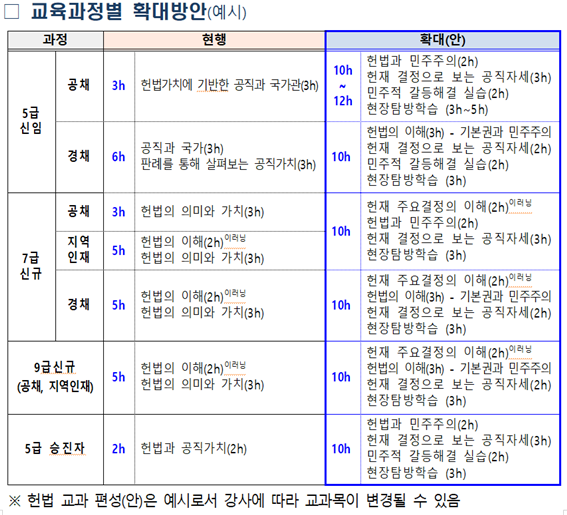[Exclusive] All Civil Servants Required to Take Annual Constitutional Education... Over 10 Hours for New Appointments and Promotions
- Input
- 2025-11-02 09:00:00
- Updated
- 2025-11-02 09:00:00


[Financial News] The government will make constitutional values education mandatory for all civil servants, significantly increasing the required hours to at least 10 for new appointments and promotions. The training will be restructured to focus on practical skills, with new advanced and department-specific courses introduced. A government-wide e-learning platform will also be used to establish a continuous learning system.
According to the 'Plan to Strengthen Constitutional Education for Civil Servants' submitted by the Ministry of Personnel Management to Wi Seong-gon, a member of the Security and Public Administration Committee, the government will expand the scope of constitutional values education—including constitutional spirit, national sovereignty, and democracy—from select officials to all civil servants.
The document stipulates that, under the Civil Servant Talent Development Guidelines, all ministries must require constitutional values education for every civil servant at least once a year. This guideline will take effect this month. By December, all central ministries must establish their own training plans, and by the end of next year, every employee must have completed at least one session of constitutional education.
The required hours of constitutional education in the basic training course for new civil servants and those promoted to managerial (Grade 5) positions will more than double. Previously, new Grade 7 appointees needed only 3 hours, Grade 9 appointees 5 hours, and Grade 5 promotees 2 hours. Now, all must complete at least 10 hours of constitutional education.
New appointees will participate in both theoretical lectures and case-based interactive training, while current employees will focus on field-based programs to enhance practical skills. The National Human Resources Development Institute (NHI) will designate constitutional values as a mandatory training item for new and promoted officials. The proportion of constitutional values in the curriculum will increase from the current 35% (public service values and national vision) to 40% (constitutional values, public service values, and national vision).
An advanced course will also be introduced. After two pilot runs this month, NHI will launch a regular three-day, 23-hour specialized 'Constitutional Values Course' starting next year. This program targets Grade 4 and below officials in central and local governments and covers topics such as understanding constitutional values, democracy in the constitution, public service values from a constitutional perspective, and strengthening constitutional competencies. Notably, the course will include interactive components like 'practicing democratic conflict resolution' and 'field visits on constitutional values and democracy,' moving away from lecture-based formats.
Department-specific courses tailored to job characteristics will also be offered. The Ministry of Personnel Management will provide guidelines so that each ministry can develop relevant programs, and will support research on systematizing constitutional values and expanding the instructor pool through the first half of next year. In collaboration with the Constitutional Research Institute and MOLEG, the government will also expand e-learning content.
This measure is a follow-up to concerns raised after former President Yoon Suk Yeol declared martial law in December last year, which highlighted a lack of constitutional awareness among civil servants. The aim is to enhance accountability and constitutional compliance across the public sector. Article 57 of the State Public Officials Act stipulates that civil servants must obey the lawful orders of their superiors while performing their duties. This has been criticized as a structural issue, as officials may feel compelled to follow illegal or unjust orders out of fear of disadvantage.
At a parliamentary audit by the Security and Public Administration Committee on the 15th of last month, Representative Wi pointed out, "There is insufficient constitutional education for public officials." Choi Dong-seok, head of the Ministry of Personnel Management, responded, "We will develop materials to ensure systematic and proper education."
Representative Wi emphasized, "The December 3 Martial Law Incident was the result of forgetting the weight of the constitution and demonstrates how dangerous a lack of constitutional understanding can be. Strengthening constitutional education will enable public officials to identify and reject unconstitutional orders, which is essential for democratic administration that serves the people."
yesji@fnnews.com Kim Ye-ji Reporter